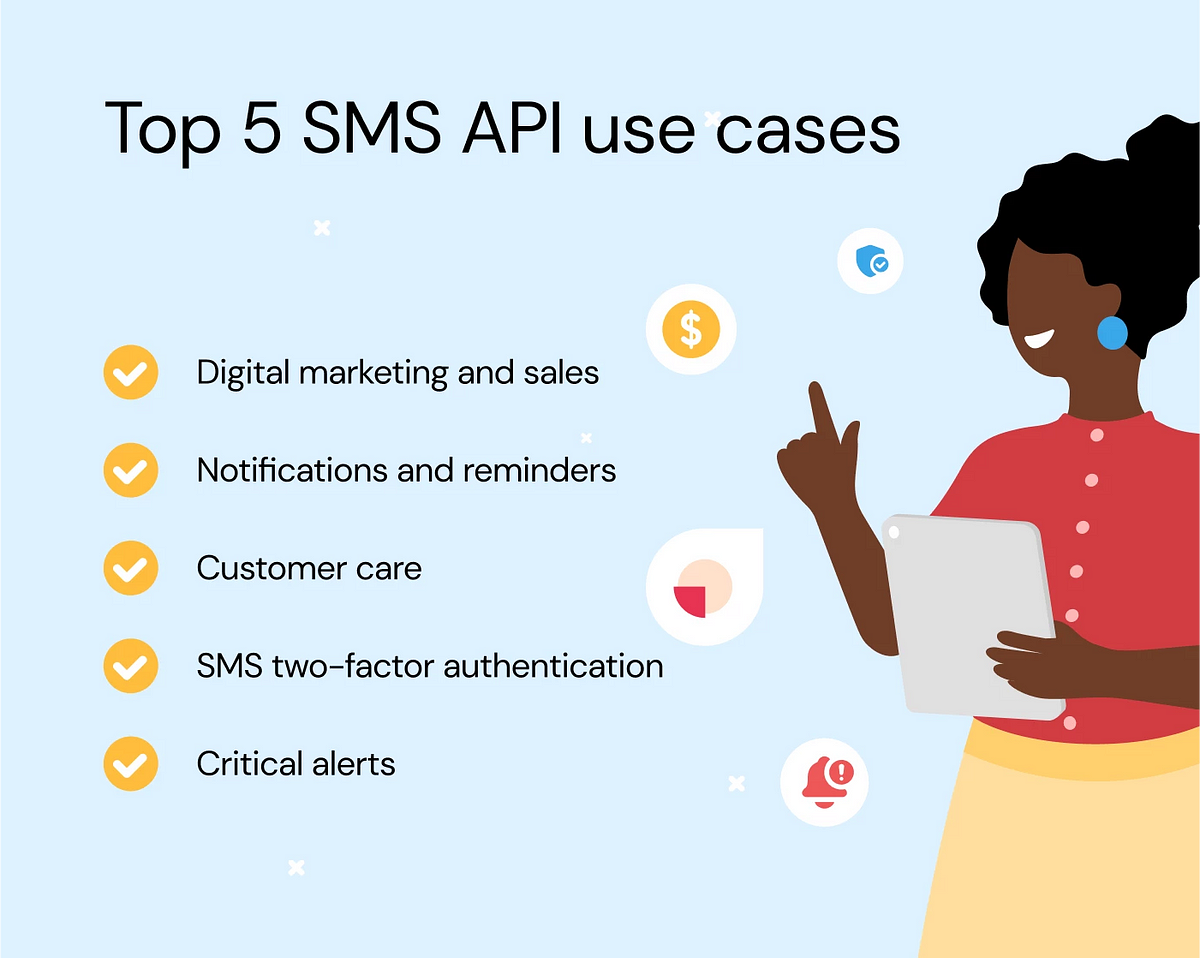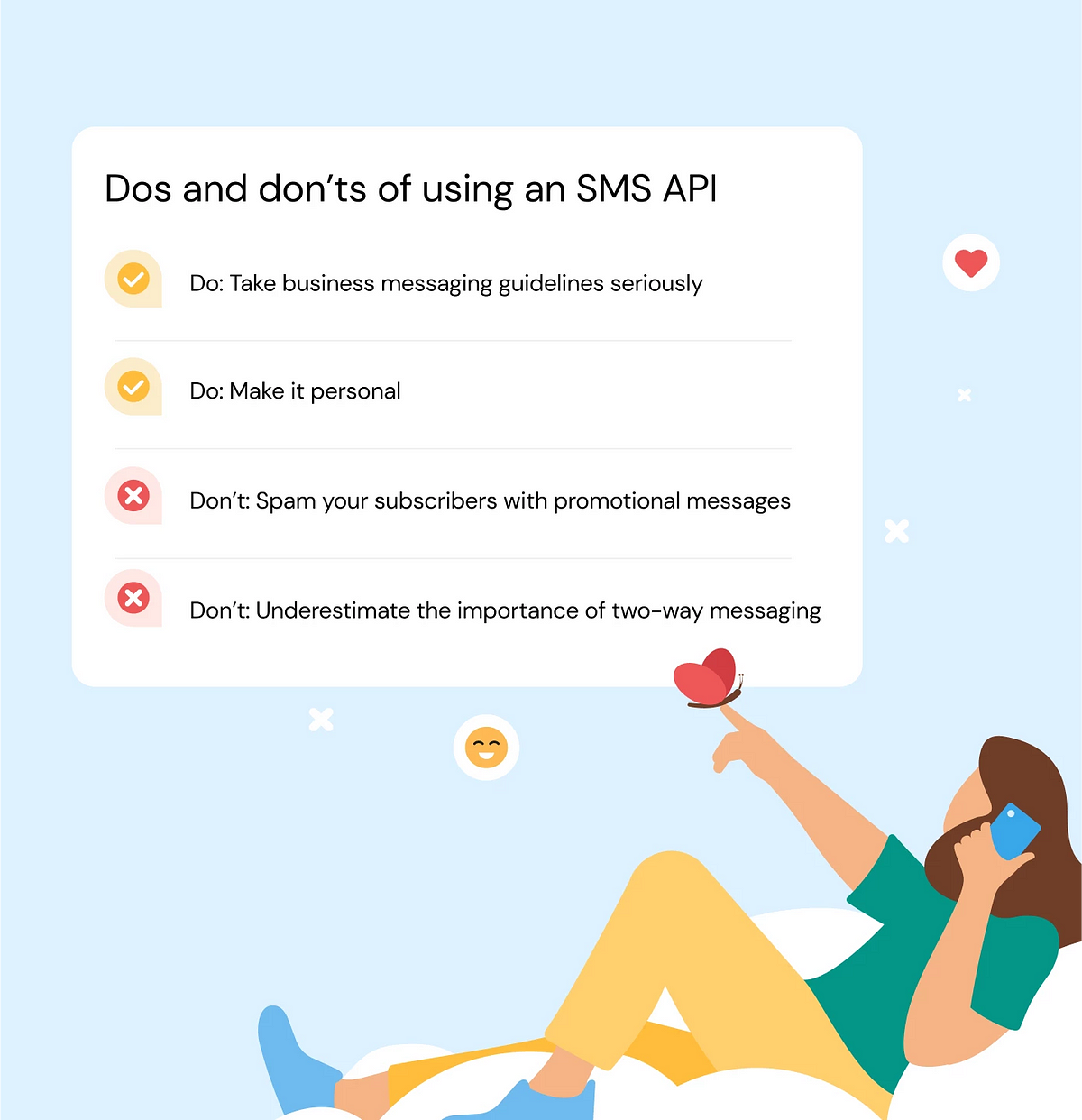The Power of Text Messaging: Your Guide to SMS APIs

In today’s digital age, bombarding customers with emails and social media notifications can feel like shouting into the void. But there’s one communication channel that continues to cut through the noise and reach audiences directly: SMS. In fact, a staggering 6.4 billion people worldwide use text messaging, making it the most widely used messaging technology on the planet [Source: GSMA Intelligence, The Mobile Economy Report 2024].
So, how can businesses leverage this ubiquitous channel to connect with massive audiences instantly and on a global scale? The answer lies in a powerful tool called an SMS API (Application Programming Interface).
Imagine a bridge between your software and the vast network of mobile phones. That’s the magic of an SMS API. It allows your applications to seamlessly send and receive text messages directly, eliminating the need for manual texting and unlocking a world of possibilities.
What is an SMS API?
An SMS API (Application Programming Interface) acts as a bridge between your software and the world of text messaging. It allows your applications to send and receive SMS messages programmatically, eliminating the need for manual processes.
Imagine integrating SMS notifications into your online booking system. With an SMS API, you can automatically send confirmation texts to customers whenever they make a reservation. This is just one example of how SMS APIs can streamline communication and enhance user experience.
How does SMS API integration work?
SMS API integration boils down to a three-step process between your application, the SMS API provider, and the mobile network:
- Application Integration: You’ll start by incorporating the SMS API into your existing software or platform. Most providers offer comprehensive documentation and tools for various programming languages, making this process smooth for developers.
- Authentication and Message Creation: When your application needs to send a text message, it first communicates with the SMS API provider using authentication credentials (like an API key or username/password). It then builds the SMS message, including the recipient’s phone number and the content itself. Some APIs allow for features like scheduling messages or customising delivery options.
Why do you need an SMS API?
In today’s digital landscape, capturing customer attention can feel like a constant battle. Emails get buried, social media notifications go unnoticed, and voicemails often remain unheard. But there’s one communication channel that continues to cut through the noise and land directly in your customers’ hands: SMS text messaging.

Here’s why you need an SMS API to unlock the true power of text messaging for your business:
Instant Attention and Unbeatable Engagement: Text messages boast phenomenal open rates, often exceeding 90%. They land directly on customers' phones, bypassing spam filters and grabbing immediate attention. This makes them ideal for sending time-sensitive promotions, appointment reminders, or critical alerts.
Effortless Integration: Most SMS API providers offer user-friendly integration processes, allowing you to seamlessly incorporate SMS functionality into your existing software. No need for complex coding or extensive IT involvement. Get started quickly and leverage the power of text messaging in no time.
Automated Sendouts: Free yourself from the manual texting grind! Schedule automated SMS messages for appointment confirmations, order updates, marketing campaigns, or even birthday greetings. This saves you valuable time and ensures consistent communication with your customers.
Deeper Customer Insights: Gain valuable data on how your customers interact with your SMS messages through delivery reports. Track open rates, click-through rates, and identify any delivery issues. Use this data to refine your communication strategies, personalise content, and improve campaign effectiveness.
Two-Way Messaging Capabilities: Foster stronger relationships and build trust by opening a direct communication channel with your customers. Respond to inquiries, gather feedback through surveys, or offer real-time support through two-way SMS conversations. This valuable interaction allows you to address customer concerns promptly and personalise the customer experience.
Reliable Message Delivery: Reputable SMS API providers, like Cequens, prioritise message delivery with robust infrastructure and partnerships with mobile network operators around the world. Ensure your messages reach your target audience, regardless of location.
No Maintenance Hassles: The SMS API provider handles the infrastructure behind the scenes. You don't need to invest in expensive equipment or manage complex systems. Focus on your core business while the API takes care of the technical aspects of SMS communication.
Global Compliance and Security: Data security is paramount. Trustworthy SMS API providers adhere to industry regulations like GDPR and CCPA, giving you peace of mind that your customer data is protected.
Cost-Effective Solutions: Many providers offer flexible pricing plans to fit your business needs. This makes SMS APIs an accessible and budget-friendly solution for businesses of all sizes. Pay only for the messages you send, making it a cost-effective way to reach a large audience.
By incorporating an SMS API into your business strategy, you unlock a treasure trove of benefits. From instant customer engagement and automated communication to valuable customer insights and reliable message delivery, SMS APIs offer a powerful tool to streamline communication, enhance customer relationships, and ultimately achieve your business goals.
SMS API use cases

SMS APIs are incredibly versatile and can be applied to a wide range of business scenarios:
- Digital Marketing and Sales: Send targeted promotions, abandoned cart reminders, and special offers directly to your customers’ phones, driving sales and boosting revenue.
- Notifications and Reminders: Keep your customers informed and engaged by sending appointment reminders, order updates, delivery notifications, or important announcements.
- Customer Care: Provide exceptional customer service by offering real-time support through two-way SMS conversations. Resolve issues quickly, answer questions, and build stronger customer relationships.
- SMS Two-Factor Authentication: Enhance security by adding an extra layer of verification for logins and transactions, protecting your customers and your business from unauthorised access.
- Critical Alerts: Reach your audience instantly in case of emergencies, system updates, or security breaches. Timely SMS alerts can play a crucial role in crisis situations, allowing you to warn customers about potential dangers, guide them through evacuation procedures, or provide crucial updates during service disruptions.
Understand the basics of SMS API technology
As you delve into the world of SMS APIs, you’ll encounter some key terms:
- Sender ID: Customise the name or number that appears when your message arrives (e.g., “Your Bank”). This helps with brand recognition and builds trust with recipients.
- Latency: The time it takes for a message to be delivered. Reliable providers strive for minimal latency to ensure your messages reach their destination promptly.
- Messaging Throughput: The number of messages your API can handle per second. This is crucial for businesses sending out high volumes of texts during marketing campaigns or critical alerts.
- Delivery Status: Track whether your messages were delivered successfully. Delivery reports allow you to monitor campaign performance and identify any delivery issues that might need troubleshooting.
- Message Encoding and Character Limits: Different character sets might apply depending on the region, and messages have limitations (usually around 160 characters per message). Understanding these limitations helps you craft concise and impactful messages.
Also read How to improve SMS delivery rates by preventing data decay [A comprehensive guide]
Texting Etiquette: Dos and Don’ts of Customer Communication

When using SMS APIs for customer communication, remember these golden rules:
SMS marketing offers a powerful way to connect with your audience, but wielding this power responsibly is crucial. Here are some key guidelines to ensure your SMS communication is effective and compliant:
Do: Play by the Rules
The world of SMS regulations can be complex, with variations depending on the target market and phone number type. But one golden rule reigns supreme: Never text someone who hasn’t explicitly opted-in. This is not just good practice, it’s the law! Always provide a clear and easy way for subscribers to unsubscribe, demonstrating your commitment to responsible marketing.
Simplify Compliance
Staying on top of ever-evolving regulations can be a challenge. Consider partnering with an SMS API provider that offers compliance expertise. They can help you navigate the legalities and avoid hefty fines or message filtering by carriers.
Do: Personalise the Experience
SMS is a personal channel. People use it to connect with loved ones. Treat your customers like friends by incorporating personalization features offered by your API. This goes beyond just names; consider the timing of your messages as well. Nobody appreciates a sales pitch at 3 AM!
Do: Embrace Two-Way Communication
Customers increasingly expect conversations, not one-way broadcasts. Research shows a significant portion of consumers try to respond to brand messages seeking information or advice. Don’t miss out on these valuable interactions! Choose an SMS API that facilitates two-way conversations — not all platforms offer this functionality.
Don’t: Become a Spammer
Bulk messaging has its place, but remember your audience is bombarded with messages from various brands across multiple channels. To avoid unsubscribe waves, prioritise value-adding messages over constant sales pitches. Focus on providing helpful, informative content that keeps your customers engaged and coming back for more.
By following these simple dos and don’ts, you can leverage the power of SMS APIs to build stronger customer relationships, enhance communication, and ultimately achieve your business goals. Remember, respect goes a long way in the world of texting — treat your customers with respect, and they’ll keep your messages coming through loud and clear.
Choosing the Right Partner: Selecting an SMS API Provider
With the growing popularity of SMS APIs, numerous providers have emerged in the market. Here are some key factors to consider when selecting the right partner for your business:
- Reliability and Scalability: Choose a provider with a proven track record of reliability and the ability to handle your message volume, especially during peak seasons or marketing campaigns.
- Global Reach: Ensure the provider offers coverage in the regions where your customers are located.
- Security and Compliance: Select a provider that prioritises data security and adheres to relevant industry regulations, such as GDPR and CCPA.
- Pricing and Features: Compare pricing plans and features offered by different providers to find the best fit for your budget and communication needs. Look for providers offering flexible plans that scale with your business growth.
- Ease of Use and Support: Choose a provider with a user-friendly platform, clear documentation, and responsive customer support to ensure a smooth integration process and ongoing assistance.
The Text Message Revolution: A Final Word
In a world overflowing with communication channels, SMS continues to stand out for its immediacy, reach, and engagement power. By leveraging SMS APIs, businesses can unlock a powerful tool to connect with customers on a personal level, streamline communication processes, and ultimately achieve their goals. So, embrace the text message revolution and watch your business communication soar to new heights.
In Conclusion
SMS APIs offer a powerful and versatile tool for businesses of all sizes. By leveraging the ubiquity of text messaging, you can enhance communication, improve customer engagement, and drive business growth. So, consider incorporating an SMS API into your strategy and unlock the potential of this powerful communication channel. Additionally, when choosing an SMS API provider, consider Cequens(a leading SMS API provider in Egypt) as a reliable and reputable option. With Cequens, you can access advanced features and robust infrastructure to optimise your SMS communication strategy and achieve your business goals.
SMS API: Frequently Asked Questions (FAQs)
Q: How much does an SMS API cost?
A: SMS API pricing varies depending on the provider, message volume, and features required. Many providers offer pay-as-you-go models or tiered pricing plans based on monthly message volume. Providers like Cequens often provide transparent pricing structures on their websites. It’s always recommended to compare plans and features from different providers to find the best fit for your needs.
Q: Is SMS marketing effective?
A: Absolutely! SMS marketing boasts impressive open rates (often exceeding 90%) compared to other marketing channels. SMS messages land directly on customers’ phones, bypassing spam filters and grabbing immediate attention. This makes them ideal for sending time-sensitive offers, appointment reminders, or critical alerts.
Q: Can I receive replies through an SMS API?
A: Yes! Many SMS APIs support two-way messaging, allowing customers to respond to your texts. This opens a valuable communication channel for customer service interactions, order confirmations, or gathering feedback through surveys.
Q: Are SMS APIs secure?
A: Reputable SMS API providers prioritise data security. They employ robust encryption measures to protect sensitive customer information during message transmission and storage. Always ensure your chosen provider adheres to industry best practices and relevant data privacy regulations.
Q: How can I get started with an SMS API?
A: Most SMS API providers offer a straightforward signup process and readily available documentation. They often provide resources like code samples and tutorials to help developers integrate the API into their applications. Many providers even offer free trials or starter plans to allow you to experiment with the API before committing.
Comments
Post a Comment